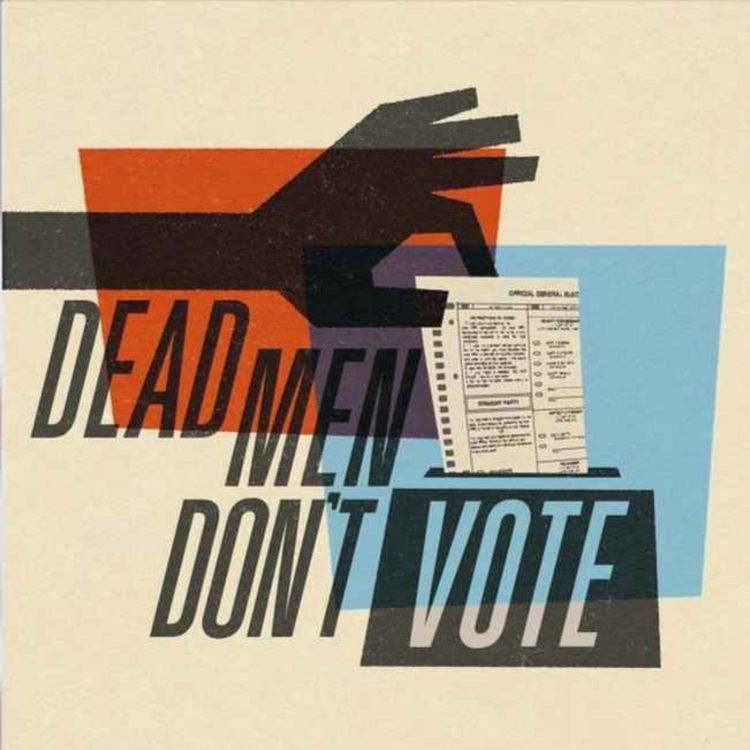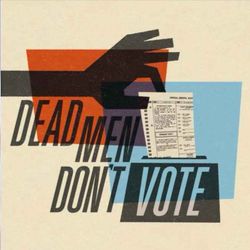Share

Dead Men Don't Vote
Do Dead People Actually Vote?
Season 1, Ep. 1
•
Greg and Cameron unpack the partial myth of widespread voting from beyond the grave in Dead Men Don’t Vote’s inaugural episode. Later, they discuss what Russia’s invasion of Ukraine says about elections before sharing “The Good Stuff,” bits of happy news from the world of elections.
More episodes
View all episodes

David Levine - Election Integrity Fellow at the Alliance for Securing Democracy
50:40|David Levine is an experienced elections professional with a wide range of expertise in election security, administration, and policy. He currently serves as the Election Integrity Fellow at the Alliance for Securing Democracy, a nonpartisan initiative of the German Marshall Fund of the United States. He also holds advisory roles with the Global Cyber Alliance's Security Toolkit for Elections, the Election Reformers Network, and the Election Verification Network. Previously, he worked at Ada County, Idaho as the Elections Director, managing elections for federal, state, and local government. His research and publications focus on the trust and integrity of the election process, and the external threats posed by malign actors.In today's conversation with David we talk about how to get to a place where voters believe in elections and their outcomes requires a comprehensive approach. We use a five Ps model to think about the election ecosystem, and at each point in that ecosystem, there are challenges and opportunities to improve election security. The five Ps are people, process, platform, policy, and politics.
The tangled web of iVoting - John Sebes and Dr. Audrey Malagon part 2
29:42|Welcome to the second part of The Tangled Web of iVoting- hosted by Gregory Miller where we explore the intersection of the internet and absentee voting. In this two-part conversation series, we will discuss the challenges of secure digital and remote voting, and how they need to be clearly understood as we approach the 2023 timeframe. In this episode, we have a very special welcome back to our audience. Joining us again for the second part of the series is Audrey Malagon, professor of mathematics at Virginia Wesleyan University and former mathematical advisor to verified voting, and John Sebes, CTO of the OSET Institute. They will be discussing the complexities of the Global Blockchain Association report comparing methods of the digital ballot. Tune in to find out more about the implications of digital voting, and how we can ensure secure and verifiable elections.
The tangled web of iVoting - John Sebes and Dr. Audrey Malagon
34:58|Gregory Miller hosts a special two-part conversation on the importance of securing digital remote voting. Joining him are two experts on the issue: OSET CTO John Sebes and Dr. Audrey Malagon, Professor of Mathematics at Virginia Wesleyan University and Board of Advisors member of the Verified Voting Foundation. They will discuss the security risks of digital ballot return methods, and provide insight on how to evaluate them.
The United States Election Assistance Commission talk to OSET
41:45|OSET Institute COO Gregory Miller along with John Sebes and Cameron Quinn interview United States Election Assistance Commission Chairman Thomas Hicks and Vice Chair Christy McCormick about how the 2022 elections went, what the EAC is working on, and how they see election administration evolving in 2024 and beyond. Please use the SpeakPipe on the podcast home page to send us your comments and questions! You can also contact our News Anchor, Roifield directly.
Wet signatures, delivering election results faster in AZ and more
24:12|OSET Institute‘s news anchor Roifield Brown brings you our election administration news recap featuring OSET co-founder Gregory Miller on wet signature requirements in Texas, delivering election results faster in Arizona, and Florida considering recalls for election officials. Please use the SpeakPipe on the podcast home page to send them your comments and questions! You can also contact our News Anchor, Roifield directly.
Election News Recap: Week of December 2, 2022
27:59|OSET Institute‘s news anchor Roifield Brown hosts Dead Men Don't Vote's election news recap. Hear from Cornell Professor Glenn Altschuler celebrate Bill Gates of Maricopa County as well as OSET experts Dana DeBeauvoir, Gregory Miller, and Genya Coulter about the most important stories from Electionland. Please use the SpeakPipe on the podcast home page to send them your comments and questions! You can also contact our News Anchor, Roifield directly.
Election News Recap: Post-Midterms Edition
32:10|OSET Institute‘s news anchor Roifield Brown hosts Dead Men Don't Vote's post-election recap. Hear from experts Cameron Quinn, Dana DeBeauvoir, and Genya Coulter about what went right and what went wrong when it came to election administration in 2022. Please use the SpeakPipe on the podcast home page to send them your comments and questions! You can also contact our News Anchor, Roifield directly.
Election News Recap: Week of 31.Oct - Voter intimidation in Arizona.
29:23|OSET Institute‘s news anchor Roifield Brown brings you this week’s election news recap including discussions with Dana DeBeauvoir on voter intimidation in Arizona, Gregory Miller on taking non-partisan election management boards, John Sebes on potential threats to the Midterms, and Genya Coulter on private grants for election administration. Please use the SpeakPipe on the podcast home page to send them your comments and questions! You can also contact our News Anchor, Roifield directly.
DMDV Does the News 10/27
29:30|DMDV producer Roifield Brown hosts a news review show exploring the most important articles in Electionland leading up to the 2022 Midterm Elections with DMDV co-hosts Dana DeBeauvoir, John Sebes, Genya Coulter, and Frayn Masters. This episode features an interview with Iowa Secretary of State Paul Pate regarding his op-ed “Opinion: Election administration is nonpartisan”.